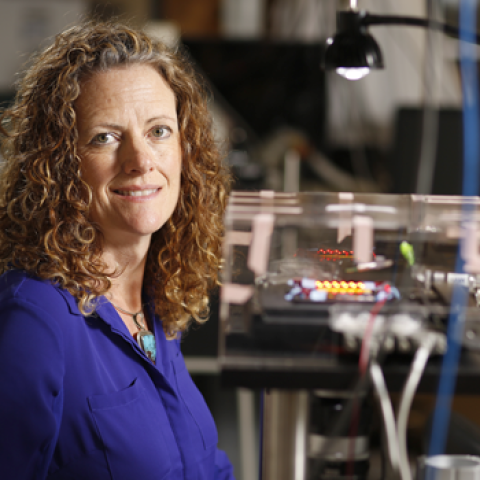Interdisciplinary Initiatives Program Round 5 – 2010
Beth Pruitt, Mechanical Engineering
W. James Nelson, Biology
Bill Weis, Molecular and Cellular Physiology
During development, cells differentiate and form specific contacts with other cells in order to create tissues. Defects in this process give rise to developmental abnormalities. Loss of cell-cell contacts occurs in metastasis, when cancer cells become migratory and escape from a solid tissue and invade another. The strength and mechanical properties of these cell-cell adhesions govern the mechanical strength and integrity of tissues subject to mechanical stress, such as the skin and heart. For example, a number of inherited and autoimmune skin blistering diseases arise from molecular defects in cell-cell adhesion assemblies. Although the molecular components are known, the relationship between these molecular assemblies and the mechanical properties of cell-cell contacts are not understood.
The proposed research focuses on how external mechanical forces influence the formation and properties of cell-cell adhesions. This collaboration brings together expertise in the design of devices to accurately measure forces at the cellular and molecular scale (Pruitt), cellular imaging to analyze the effects of force application to cells (Nelson), and biochemical and biophysical characterization of molecules in cell-cell contacts (Weis). Additionally, the interface between these groups provides a novel training platform for postdoctoral fellows, and undergraduate and graduate students in team building and multi-disciplinary research that crosses boundaries between engineering, biophysics, biochemistry and cell biology. The ability to examine the effects of forces on both cellular and molecular scales offers a powerful way to define precisely the relations between molecular and structural intracellular organization, cell mechanical properties and cell behavior. The specific goals of the proposal are: 1. Identifying proteins that allow cells to sense mechanical force at cell-cell contacts. 2. Tracking proteins in cell-cell contacts in living cells as the cells respond and adjust to applied forces. 3. Determining how force can alter the molecular properties of proteins in cell-cell contacts. These studies will define the mechanisms of tissue cohesion at a subcellular scale and provide a framework to predict adhesive conditions likely to favor tissue cohesion (strong cell-cell adhesion, reduced cell motility) or cell migration (weak cell-cell adhesion and increased cell motility).


